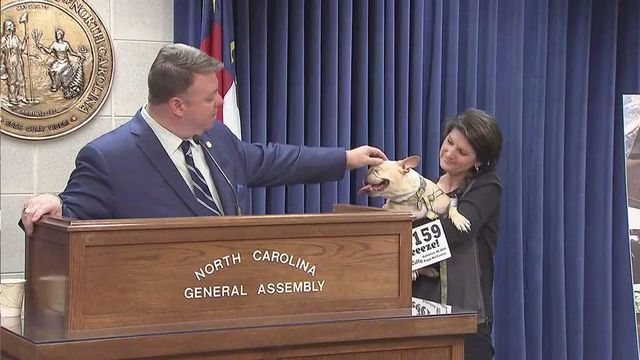Despite setback, puppy mill foes fight on
A bill to license and regulate large commercial dog breeders is likely off the table for the session, but animal advocates say they'll continue to push for basic standards of care for dogs in those facilities.
Posted — UpdatedLida and her husband, David Hayes, from Winston-Salem, adopted Munson in 2012 after he was rescued during a puppy mill bust in Stokes County. He was in horrendous shape: sick, filthy, underweight, with ear and skin infections and emaciated feet.
“He could hardly put his feet down from standing in urine and feces. The acid from the urine had just eaten his feet up,” Lida Hayes said Thursday. “He was in a cage with numerous other dogs, just like sardines packed in together. It was terrible. That’s just the only word for it.”
At first, she said, he was afraid of walking on grass, and he wouldn’t eat food from a bowl – it had to be strewn on the floor.
“He was used to eating food right beside his feces,” she remembered. “He was used for breeding, and that’s it.”
The puppy mill Munson was rescued from is already back in business. According to state Humane Society spokeswoman Kim Alboum, the breeder was given a two-year suspended sentence.
“To think this is open now and operating again after a slap on the wrist – if they even got that – is sickening to my stomach,” Lida Hayes said.
A bill that would have kept the breeder shut down, however, is off the table for the session.
Rep. Jason Saine, R-Lincoln, had filed House Bill 159, a large commercial dog breeder bill that would have required breeders to be registered and inspected, with standards for sanitation and housing. Any breeder found guilty of cruelty or neglect would not be allowed a license in the future. The bill also would have moved the oversight agency – the Division of Animal Welfare – from the Department of Agriculture & Consumer Services into the Department of Public Safety.
However, at a news conference Thursday, Saine said the tougher bill has met some resistance.
"So, in the spirit of compromise, we have put forward the commercial dog breeder language that passed the House 101-14 in 2013," he said. "We can move this issue forward and hopefully pass a bill that will make a difference.
"Despite our efforts over the last two years, North Carolina continues to be a magnet for some of the worst puppy mill operators," he continued. "Because North Carolina currently has no state law that provides basic standards of care for dogs in puppy mills, conditions have to reach the level of animal cruelty before law enforcement can do anything for these dogs. And that’s a very high threshold, as many of you know."
The 2013 bill did not require registration or inspection. Instead, it spelled out mandatory basic standards of care – food, water, shelter, exercise and veterinary care – for dogs belonging to any breeder actively breeding 10 or more female dogs for the purpose of selling the puppies to the public. It would not apply to breeders of hunting or sporting dogs, show dogs or any dogs "kept primarily for purposes other than the sale of offspring as pets."
"I know last session, some folks thought it didn't go far enough, and that’s probably a fair criticism,” Saine said. "But I kind of operate under the assumption that we need to at least start making progress."
The bill passed the House easily but "got held hostage over in the Senate," Saine said, even though he said his polling of Senate members showed it had majority support in both the Republican and Democratic caucuses.
"So, we have friends over there. Hopefully, there’ll be capacity to take this up," he said.
More than 1,600 dogs and puppies have been rescued in puppy mill busts in the state since 2011, and Wake County SPCA director Kim Janzen said her group has been at the forefront of many of them, seeing dogs in conditions she described as "heartbreaking and almost impossible for me to describe to you adequately."
"Picture your own dog and imagine her in a tiny cage, with feces so deep that they cover her feet," Janzen said. "It's not an exaggeration, it's not sensationalism. We have seen this time and time again. It is the reality, right here, right now, today, for thousands of animals in North Carolina.
"Here's the really uncomfortable truth: It is entirely preventable," she continued. "We are not talking over-regulation here. We are talking about the most basic care imaginable."
Nonetheless, a number of groups, most notably the American Kennel Club, fought the 2013 bill, arguing that it would unfairly regulate and penalize breeders.
Reaching down to scratch her dog's head, Lida Hayes said she would combat those arguments by visiting Senate leaders Thursday and telling them Munson's story.
"We don’t want any other animal to have to live like Munson did. He’s too good of a dog,” she said. “As they say, ‘damn good dog,’ and he is.”
The bill is expected to be heard in the House Rules Committee next week.
Related Topics
• Credits
Copyright 2024 by Capitol Broadcasting Company. All rights reserved. This material may not be published, broadcast, rewritten or redistributed.






